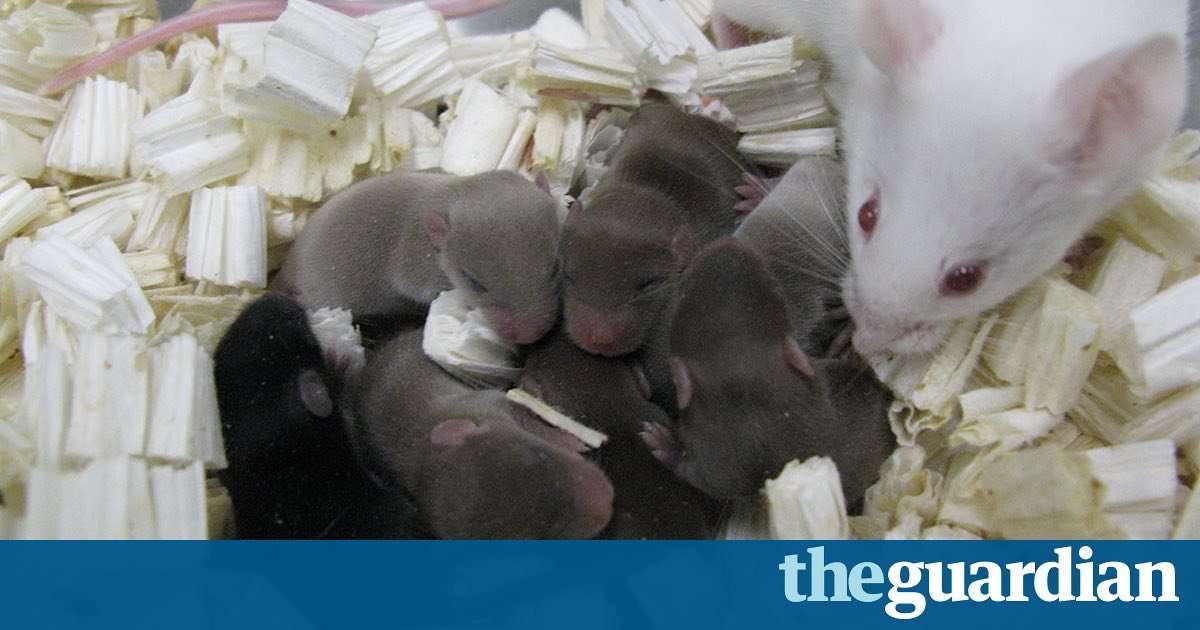Scientists say success of freeze-dried mouse sperm stored on international station could be significant for human reproduction when ‘space age’ arrives
Reproduction may be possible in space, Japanese researchers have said, after freeze-dried sperm stored on the International Space Station for nine months produced healthy offspring.
The scientists said their findings could have significant ramifications for human settlements in space, which they consider “likely”.
The average daily radiation dose on the ISS is about 100 times stronger than that on Earth, posing a threat of serious reproductive problems for any space-dwelling organism.
But mouse sperm stored on the ISS for 288 days from August 2013 to May 2014, then returned to Earth, fertilised in vitro and transferred into female mice, produced healthy offspring.
Global partners could consider extending life of ISS Read more
Professor Teruhiko Wakayama, of the advanced biotechnology centre of the University of Yamanashi in Kofu, told the Guardian that the finding could prove significant if humans started living in space permanently.
“Not necessarily for healthy people – however, on the ground, many couples require assisted reproductive technology to make babies, and it would continue in the future, including in space.
“Our study suggests that sperm preservation in space is possible for at least nine months.”
The space-preserved samples showed evidence of slightly increased DNA damage compared with control samples preserved on Earth, but this was found to be largely repaired in embryos following fertilisation.
The birth rate and sex ratio of pups derived from the sperm stored in space was comparable to those of pups derived from the control samples. Subsequent whole genome analysis revealed only minor differences, and the pups developed into adults with normal fertility.
“Although those sperm had a little bit of damage by space radiation, the following offspring were all normal,” Wakayama said.
The study was published in the proceedings of the US National Academy of Sciences on Monday.
Wakayama and his fellow researchers predicted that people would live in space for several years or even over many generations, with assisted reproductive technology used to maintain the genetic diversity of humans and animals.
The effects of space radiation and microgravity on mammalian reproduction were largely unknown, but the study of reproduction in space was “a very important subject for our future”, Wakayama wrote.
Wanted: space volunteers willing to lie in bed for two months – for €16,000 Read more
Studies of the effects of microgravity on early development in sea urchins, fish, amphibians and birds had concluded that it did not prevent animal reproduction, but mammals had proved more difficult to keep and test in space.
Humans living for several generations in space habitats, or travelling to Mars, would be exposed to much higher cosmic radiation, which could put them at high risk of cancer.
“The purpose of our project is to know whether mammalian reproduction is possible in space or not,” said Wakayama. “Unfortunately, to bring live mice and take care [of them] in space is too difficult. Therefore, we decided on a very simple experiment, which we could perform even with the current technology.”
Given the challenging and largely uncharted conditions, researchers were cheered by the findings.How long the sperm could be preserved without damage remained to be seen, Wakayama said, though he was confident that sperm-drying methods would improve.
“Our results demonstrate that generating human or domestic animal offspring from space-preserved spermatozoa is a possibility, which should be useful when the ‘space age’ arrives.”
The next step in the project, already funded by an international grant, would be to send mouse embryos to ISS and culture them under microgravity, he said.
Wakayama has had several high-profile successes in cloning mice, the main area of his research. In 2008, he cloned healthy mice from dead ones that had been frozen for several years, raising the possibility of “resurrecting” extinct animals from their frozen carcasses.
In April last year, he was one of a team of researchers to successfully clone mice from cells found in urine.
“We are now trying to make clone from mouse faeces, but so far no success,” he told the Guardian. “I hope you could understand my poor English. English is much harder than to make clone.”

BeardedGingerWonder on May 22nd, 2017 at 21:11 UTC »
In theory, with an artificial womb could ova and sperm be sent out into space and grow a human when the ship arrives wherever. Robot to raise the child. Kind of like a "final ark" solution.
babygrenade on May 22nd, 2017 at 21:09 UTC »
Now all we need to do is figure out how to make humans from mouse sperm!
PragmaticParadox on May 22nd, 2017 at 20:17 UTC »
So in theory could we send all female crews to colonize new planets?
I suddenly feel so redundant.